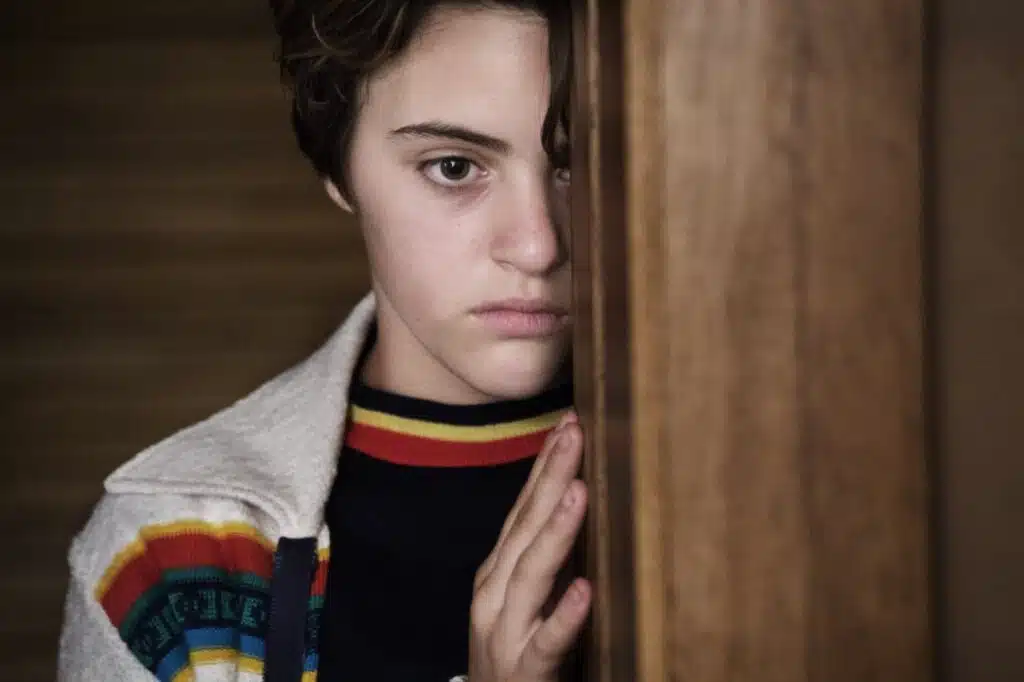Preferring to watch movies unprepped, I hadn’t realised when I started watching L’immensità that its director, Emanuele Crialese, was a trans man (ie started life as a woman). What I did know is that I liked the earlier stuff, movies like Nuovomondo and Respiro, which were beautifully crafted stories demonstrating the writer/director’s way with emotionally engaging characters.
The world didn’t know Crialese was trans either, by which I mean the media. Crialese “came out” at the Venice Film Festival as a way of explaining his film, which is set in Rome in the 1970s and focuses on a girl on the verge of puberty who really wants to be a boy. Since Crialese was born in 1965 in Rome it’s no stretch to suggest this is his story.
“I didn’t want to talk about just me,” he told the press conference. And a good way of doing that is by misdirection, such as the starry casting of Penélope Cruz as the mother, a woman locked in an unhappy marriage with a husband who is having an affair with his secretary, inside a society where men leer at anything in a skirt, even if the woman is obviously a mother walking home with her child.
Cruz is the big name and plays Clara as a fiercely protective mother defending her daughter’s wish to be treated like a boy as if she were defending her own space – which in a way she is. Cruz is something of a feint though. The film’s real star is Luana Giuliani as young Adriana, who’d rather be Andrea (a mostly male name in Italy. Think: Andrew), and whose emotional life starts to take on the desired shape when Adri (as mother Clara slightly ambiguously calls her) meets a pretty young Romany girl (Penélope Nieto Conti) behind the family apartment in a place where the children are forbidden from going.
There are two tentative journeys away from the strictures of Catholicism and patriarchy to the potential uplands of fulfilment: the mother’s and the daughter’s, with the other family members – strict but wayward dad Felice (Crialese regular Vincenzo Amato), and siblings Gino (Patrizio Francioni) and Diana (María Chiara Goretti), largely incidental, though Crialese takes pains to make the characters more than mere ciphers. Gino in particular, a kid who seems to have his own issues with eating and his tendency to shit on the carpet. Surely a detail lifted from real life?
Crialese’s picture of Roman family life in the 1970s is rich but he seems alive also to the accusation that this is an issue-driven drama and that wallowing in other people’s misery isn’t necessarily what people want to spend their evenings doing – there are baking shows to watch on TV after all.
He counters with two strategies. At key moments he throws in a musical number – the film is named after one of those big weepy Italian songs of the 1960s and the song-and-dance sections (reminiscent of Dennis Potter’s breakout wish-fulfilment fantasies in The Singing Detective) are camp spectacles of excess, the direct opposite of the emotionally honest social-realist gruel he’s otherwise serving up.
The other is a faint suggestion that he’s tracking Bergman’s Fanny and Alexander – another tale of childhood switchbacking between the idyll and the miserable – with Crialese’s staging of get-togethers by the extended family particularly reminiscent of Bergman’s big party sequences.
I bought the Bergman as an honest strategy, the musical stuff far less so. It seems to me to be Crialese’s admission that there isn’t quite enough going on in the emotional interiors of his characters, or if there is he cannot access it. Which is unusual, because that’s what he usually really excels at doing.
This is minor quibble stuff, really, if you’re in the mood for a family drama with some emotional resonance, a gloriously realised portrait of middle-class Italian family life in the 1970s (so much orange) and ensemble acting of a high order, L’immensità has plenty going on.
L’immensità – Watch it/buy it at Amazon
I am an Amazon affiliate
© Steve Morrissey 2023


